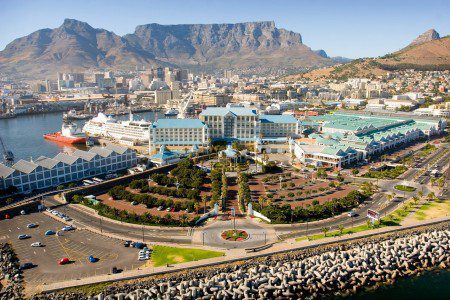South Africa: A Dark Country

The South African power Giant Eskom has turned South Africa into a dark country. The failure to supply electricity to the country and implementation of load-shedding is ruining the economy. It is not only the supply of power, but the corruption and other crimes have given South Africa the appearance of a dark country.
There is a clear indication the ruling African National Congress (ANC) party is under collapse and must stop corruption as indicated by Transparency International (TI). TI announced that South Africa scored 44 percent for fighting crime while countries Oman and Rwanda rated better than South Africa.
The numerous alleged scandals engulfing President Jacob Zuma and the ANC administration have affected South Africa’s perception in the eyes of the world. South Africa is perceived to be a corrupt country. The Nkandla scandal, the Spy satellite and tapes saga, the Gupta scandal, and the Arms deal are examples of high-profile and embarrassing state of affairs for South Africa. The devastating death of South African soldiers in Central African Republic (CAR) remains an unresolved mystery. The reputation of a democratic country is tarnished, and the international standing as a state for stable investment is volatile.
It is estimated that South Africa loses over ZAR30 billion a year to fraud and corruption. This loss has an adverse affect on the ordinary people in the country. Fewer hospitals, insufficient schools, and unstable power supplies stagnates the economy while the ANC government lose billions to fraud and corruption.
Eskom, the power giant of South Africa, continues to boast of huge profits for the end of the financial year in March 2014. Eskom generated a net profit of R7.1 billion and although this figure is R5.2 billion more than the previous year, and under the R12.2billion confirmed for the six months ending September 2013. That is hefty amounts of profit for the state-owned sector to achieve and assumed credit given to management for successful administration.
The sustainable development is a commitment made by Eskom for the entire country and on their website is the following, “Eskom has integrated sustainable development issues into decision-making for many years. Given that our sector is long-term in nature and that many decisions have implications for decades, it is vital that we take robust and responsible decisions.”
It is a comforting thought to know that the Eskom power supply makes “robust and reliable decisions.” However, it may not be the case, given the fact that load shedding is popping up repeatedly. Eskom, the power giant of South Africa, has implemented the following growth over the past twenty years.
During 1994, Eskom operates 37,636MK of generating capacity. In 2000, over two million government built homes received electricity and saw a significant change in management balancing racial equity. During 2003, the Klipheuvel wind farms were commissioned and a decision to service the unproductive Camden, Komati and Camden power stations.
In 2005, spending was over ZAR10 billion on black economic empowerment (BEE) and in 2007, the construction of Medupi and Kusile power stations started. The demand factor placed the country’s power grid under severe pressure during 2008 and Eskom implements load shedding in South Africa. During 2009, Eskom completed five open-cycle gas turbines. In 2011, Eskom raised USD1.75 billion by issuing a US dollar bond. The Camden power station ceased operation in 2013. A total amount of ZAR119.4 million was spent on BEE compliant suppliers. Eskom spent a total of R132.9 million on corporate social investment projects. Since 1991 more that 4.5 million homes in South Africa received electricity.
Impressive decision-making by the Eskom top-dogs and considering that in 1994, all power stations were operational. The supply and demand have increased significantly since 1994 with a population growth increasing from 39 million people to 53 million in 2013. Available statistics reveal that operational powers stations were fully functional in 1994 and that numerous new power plants have been commissioned but not completed.
Eskom had increased its employment capacity and contributed to job growth to expand the power supply. Eskom employees have agreed the company offers significant benefits, in the form of social security progress, free lunches, medical aid, and pension funds. Governed by the Solidarity, and National Union of Mine Workers unions, employees often turn to these representatives for leadership and guidance. The unions often raise impossible demands for management to accomplish, and most staff agrees that Eskom is a good company; many have vented their frustration at bad management and contractual work.
There is a no power thanks to Eskom’s prerogative. Every senior manager is entitled to a substantial salary. Prior to 1994, under the apartheid government, there were no blackouts (politically incorrect to say blackouts should be previously lit up). Load shedding, continual blackouts continue and Eskom will always have a reason for the recurring happening. The most surprising excuse was the story about the torrential rain wetting the coal reserves. The rain, according to Eskom is responsible for the coal being wet. It is assumed that Eskom would have facilities to ensure that the coal bed for combustion was dried prior to loading.
It is disturbing to note that the ANC is afraid of apartheid and blame a lot on it. in fact; it appears that the governments after 1994 have all been inhabited by pusillanimous leaders. The ANC does not to have the guts and pride to sort out this mess, and apartheid is being blamed.
During the apartheid heydays, the world was acquiring unusual profits on investment into apartheid. Rising expectations and increase in living standards became the norm from the accelerated profit growth. Production costs increase and profits decrease. South Africa has a vast treasure trove of mineral riches and Eskom the state-owned corporation is not exempt from indulging in the treasures.
Read more at http://guardianlv.com/2014/12/south-africa-a-dark-country/#ufoouFhHckiqpdwF.99
No comments:
Post a Comment